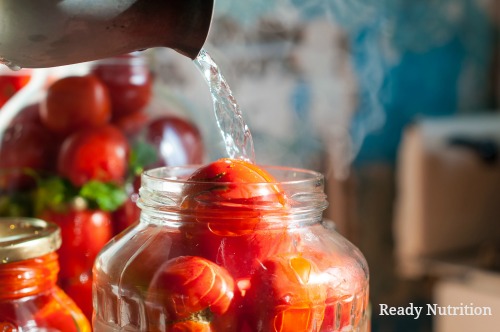“That morning, when Helen apprehensively opened the freezer, she found several hundred pounds of choice and carefully wrapped meat floating in a noxious sea…As any housewife would do under the circumstances, she wept. This disaster was perfectly predictable, Randy realized. He had been a fool. Instead of buying fresh meat he should have bought canned meats by the case. If there was one thing he certainly should have foreseen, it was the loss of electricity.” – “Alas, Babylon,” by Pat Frank, page 151

Readers, there’s your standard…what to read and what we may very well face. The cited work, if you’re into disaster fiction/apocalyptic reading is the end-all be-all of survival stories of how a community organizes and makes it through a nuclear war. It is not so much a how-to as a story with real-life situations that average people face.
How To Save Perishable Food In An Off-Grid Emergency
What we are focusing upon is the initial problem: refrigerated food, and an emergency just hit and took out all of the electricity. In this day and age, most of the family is working and out of the home. Still, someone will return home eventually and the actions that are taken could very well save your family some of the foodstuffs they have. If you read the articles I wrote on my personal experience during Hurricane Katrina, I detailed how I prepared all of the food that was in the refrigerator prior to the power going out.
To be sure, you’re going to lose some food. There are generators, yes, but you’re going to have to weigh the use of it with silence around the house. Picture the scenario of three days or so after an EMP and you are the only house on the block with a generator running. There’s a formula for disaster via the marauders who used to be the friendly neighbors chatting about the football games. So what can be done?
An ounce of prevention is worth a pound of cure.
One thing the can be done is to start stocking a prepper’s pantry in your home. Foods that are shelf stable and nutritious are the best to stock. Here is a list of 25 must-have emergency foods and how to get them organized. Along those lines, you want to ensure you have canning supplies, Mylar storage bags and plastic bags on standby to store all the food you are about to preserve.
Another method that is done in the JJ home is when the groceries are brought home, all meats are cooked immediately, placed into Ziploc bags, and then into the freezer they go. Remember, after a power outage your fridge will still keep things cool for about 24 hours. The frozen meat adds about another 24 hours to its “frozenness” until it needs to be consumed. You can do this with other portions of food as well, such as soups, pasta, vegetables, and so forth. It’s better to have it a few days longer than to lose it in the first 24 hours.
Now what do we do? Here’s a possible solution. That frozen meat? It’s cooked, so if you have the generator, why not stack up those dehydrator machines with already-cooked meat and dry it out? It would be a one-day risk, and you could dehydrate a certain amount of it and have it last a little longer. There’s also another method. Break out your canning manuals, and prepare to can. For this you’ll need something a little special. Here’s what I have: The Coleman two-burner dual fuel stove.
Yes, that green camping stove…runs on white gas/Coleman fuel or gasoline. The reason this is a “goodie” is that you can steadily regulate your temperature and pressure with this little gas-burner stove as you are monitoring your work. Such regularity is important when it comes to canning. Can away! You’ll need to know your stuff: your elevation and the proper recipes that you have in your canning manual for your ratios of seasonings and salt. Can the meat, can the veggies, can whatever you can! Better to save most of your food than eat akin to the proverbial last meal and lose most of it.
Meat can also be salted; therefore, it would behoove you to pick up some 25 – 50 lb. bags of salt, and whatever can’t be canned can be preserved in this manner. Then there’s the Brinkman, the smoker. Yes, time to break out the charcoal and mesquite chips and smoke the daylights out of that meat. Smoke some veggies, and dehydrate them as well. It’ll be a race of the likes of which you’ve never run. Have a woodstove? Well, you can scramble all of your eggs on the top of the stove on a baking pan (hopefully yours has a lip). Scrambled hard…and then you can dry them out after cooking them.
Seafood is tricky. I’d throw that in the Brinkman and smoke the daylights out of it, being careful to season it, as dried fish on its own tastes pretty crappy. Just try and avoid the use of butter or dairy sauces or any cheese. That’ll make the meat go rancid as it goes south.
Speaking of which, if you’re going to have any kind of a “gorge” then make it a breakfast special. Break out the pancake mix, and eat up all of the dairy products that you can for the next couple of meals, while the electricity is out and the fridge is still within that 24-hour window. Load up on the powdered sports shakes, the grilled cheese sandwiches on the woodstove, the pancakes and cereal, because fresh milk will be a thing of the past, barring Bessie the cow being tied up outside in the backyard.
You can use the sun to dry out your fare if you have the time, and that is a big if. You need to get everything cooked and/or canned, and get it out of sight. The day started out as “Rebecca of Sunnybrook Farm,” but after an off-grid disaster, you can bank on the day ending as “The Planet of the Apes.” Out of sight and out of mind. Get it cooked, dried, smoked, and canned, and get it in your vehicle if you’re getting out of Dodge, or get it out of sight.
Yes, there’s always room for improvement in this case, and any tips or suggestions you wish to add will be great to glean some of your experience that you have tested on your own. The most important thing: go into action on this immediately. You don’t have time to waste, and it’s best to get it all done before the “Drama in Real Life” becomes more real, and more dangerous. Save the food, get it out of sight, and then be ready to defend it. Hopefully it won’t come to that, but then again, it’s better safe than sorry. Hope this piece gave you some “food for thought,” and we look forward to hearing from you. Keep up that good fight! JJ out!
Learn the ways of our ancestors. The Lost Ways Book teaches you how to preserve all your food like our forefathers did for generations and survived with only what the land offered to them.
Jeremiah Johnson is the Nom de plume of a retired Green Beret of the United States Army Special Forces (Airborne). Mr. Johnson was a Special Forces Medic, EMT and ACLS-certified, with comprehensive training in wilderness survival, rescue, and patient-extraction. He is a Certified Master Herbalist and a graduate of the Global College of Natural Medicine of Santa Ana, CA. A graduate of the U.S. Army’s survival course of SERE school (Survival Evasion Resistance Escape), Mr. Johnson also successfully completed the Montana Master Food Preserver Course for home-canning, smoking, and dehydrating foods.
Mr. Johnson dries and tinctures a wide variety of medicinal herbs taken by wild crafting and cultivation, in addition to preserving and canning his own food. An expert in land navigation, survival, mountaineering, and parachuting as trained by the United States Army, Mr. Johnson is an ardent advocate for preparedness, self-sufficiency, and long-term disaster sustainability for families. He and his wife survived Hurricane Katrina and its aftermath. Cross-trained as a Special Forces Engineer, he is an expert in supply, logistics, transport, and long-term storage of perishable materials, having incorporated many of these techniques plus some unique innovations in his own homestead.
Mr. Johnson brings practical, tested experience firmly rooted in formal education to his writings and to our team. He and his wife live in a cabin in the mountains of Western Montana with their three cats.


One Reply to “How To Save Perishable Food In An Off-Grid Emergency”